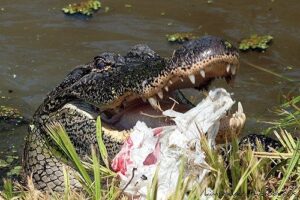Next time you think about throwing trash out the window, you might want to think twice. It may seem like your tiny bit of garbage isn’t doing much harm to our beautiful local habitats, but would it change your mind to know litter currently costs Louisiana over $40 million?
Act 72 (HB 111), signed into law by Governor Edwards during the 2017 regular legislative session, requires that litter education and prevention be taught in Louisiana public schools from kindergarten through fifth grade. The state, however, will not dictate how the law will be implemented, and there is no anticipated direct material effect on governmental revenue. Susan Russell, Executive Director of Keep Louisiana Beautiful, says litter education is critical because it will give children the tools they need to create and sustain environmentally friendly habits.
“We are counting on them to break the cycle of neglect and to raise the bar for a clean and beautiful Louisiana,” Russell says. “It’s our hope and expectation that they will become environmentally responsible young people and leaders of tomorrow. They will be best equipped to handle this challenge through lessons learned in the classroom.”
Litter itself and the way it is handled has changed tremendously over the past few decades. There is now single use waste, like plastic water bottles and plastic bags, at every turn, which was not a widespread problem for older generations. And, unfortunately, parents often do nothing to break the cycle and educate their children. Russell acknowledges, “Parents and families and the broader community do play a role in this education, and it must be taught and reinforced in schools.”
Keep Louisiana Beautiful and other like-minded organizations have created free lesson plans that are aligned to the state learning standards. Teachers and schools can download these plans or develop and use their own curriculum. Basically, this law should enhance education, not detract from it. “This will not put an additional burden on the teachers or take away from instructional time because littering concepts can be used as a tool to teach core subject matter,” Russell says. “Schools also have the flexibility of deciding to use currently developed lessons, conducting school-wide programs, or embedding it into existing curriculum.”
Pollution affects every person in our community, no matter race, gender, or economic background, and it cannot be ignored. It affects tourism and wildlife, and it has even become a public safety issue. “The appearance of our state is a direct reflection of the people who live here,” Russell says. “It’s a problem that sooner or later Louisiana is going to have to address in a big way. It will not go away on its own, and we cannot pick up our way out of this problem. This law will add teeth to our environmental education efforts, but we will also continue our education work in local communities to support and reinforce what is being taught in the classroom.”





